by Will Yurman
We are a country divided.
And we will elect a new President this November. This isn’t news.
We are also more partisan, less trusting, and don’t respect let alone tolerate the “other side.” In their book, “Respect and Loathing in American Democracy,” the authors Jeff Spinner-Halev and Elizabeth Theiss-Morse examine the question of respect. (A good interview with them can be found on this podcast.)
They define tolerance as the low bar. You might dislike or hate someone, but you put up with them. What does that look like? I may hate you, but I won’t hit you? You’re entitled to your opinion, but you’re wrong, and I don’t want to understand you.
A low bar indeed.
Respect, they write, is something more. “To practice respect is harder and more far-reaching than toleration.”
Civic respectcivic respect The authors of Respect and Loathing in American Democracy define civic respect as taking the views of our fellow citizens seriously and allowing for legitimate disagreement. It means, according to the authors: Listening to those with different views. Listening without assuming the worst about the person talking. Not assuming that citizens who vote differently do so because they are poorly informed, ignorant or misled. , “recognizes that there are many different beliefs and values and viewpoints and that we should respect people by being willing to listen and engage with those whom we disagree.” Yes, different people believe different things. Respect them, listen to them, engage with them. That’s the idea, they write.
And yet, it is so hard. We get so angry. We distrust those who disagree with us. They are wrong, or stupid, or sheep, or don’t read, or don’t see the facts in front of their face.
The authors found in a 2018 survey that only 10% of Democrats and 21% of Republicans “find it easy” to respect the other party. About half of each group said they tried. And 25% said they used to respect the other party, but have given up trying.
Why? I wish I had an answer. What to do about it? I’m not sure. And I’ll be honest. I have beliefs and feelings and strong opinions. I am prone to what feels like a hard-wired involuntary response that is not gracious or understanding. So I am talking to people. And I find myself a little less reactive, a little more thoughtful. Their stories are below.
A life-long Democrat, Julie Ellis has trouble understanding Republicans.
Julie’s dad was always a Democrat.
Her dalliances and digressions from the party line were minor and fleeting. A teenage flirtation with Henry Cabot Lodge Jr. I had to look it up. He was the 1960 Vice-Presidential running mate of Richard Nixon.“I thought Henry Cabot Lodge was just the most handsome thing in the world,” she said—reason enough for a 14-year-old to hang a Cabot Lodge poster on her bedroom wall that year.
Then, as a 20-something, she cast her first vote, and it was for a Republican candidate for governor of Alaska. “I didn’t tell my dad,” she whispered, now 60ish years later. “I don’t know,” she answered to the obvious question, why. “I really liked him and thought he was a good guy. God, I don’t even remember who it was now,” she said.
“But I reformed,” she said with her husky laugh.
And she’s sure she’s never voted red again. “No, no, no, no. Because I know my dad would come down, and the bolt of lightning would hit me.”
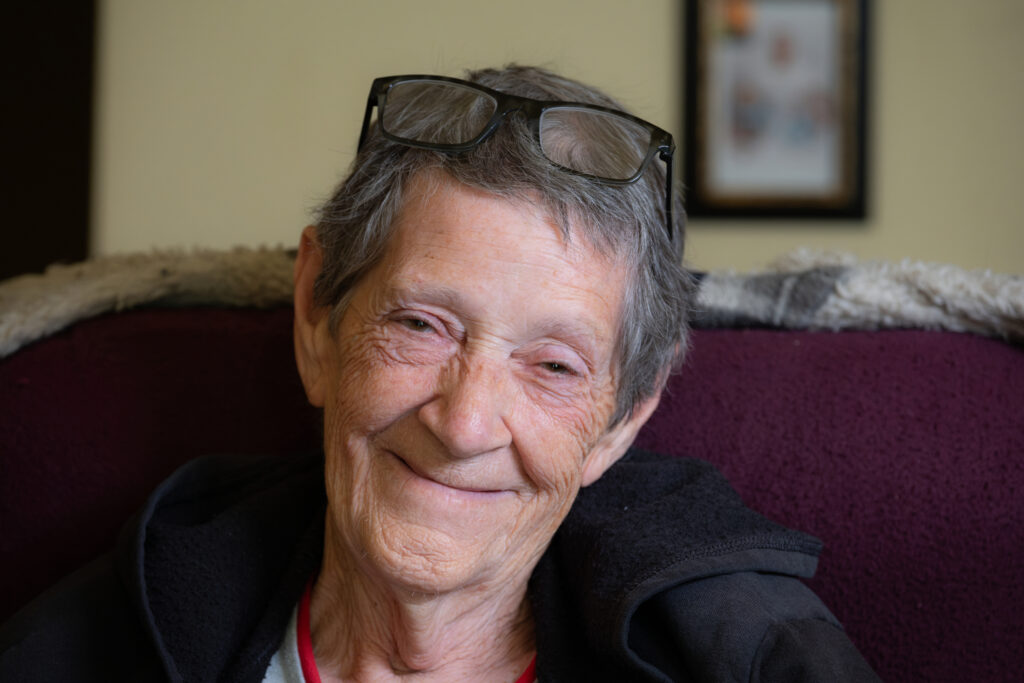
Beyond the fear of retribution from above, Julie Ellis makes it clear – in her mind, today’s Republicans are not your father’s (or mother’s) Republicans. They’ve changed, she said repeatedly. She sees current Republicans as selfish – out for themselves.
Though she is quick to distinguish between Republican leaders and the rank and file, and counts some Republicans as good friends, she also makes it clear she just doesn’t understand them.
Julie thinks the times have changed as well. She said growing up in the 1950s was Leave it to Beaver idyllic. “Ride your bicycle every place, get into trouble, be late for dinner.” An awesome way to grow up, she said with delight. “We’d play marbles in the middle of the street. And it was super good.”
And today, well, “I think it’s a lot different now. How many kids do you see climbing trees, you know, and riding their bikes? They’re always on their phones and doing other stuff.”
There are places in everyone’s story where we can argue and debate. Were the 50s idyllic? Doesn’t every generation bemoan “kids today”? When we talk of change, how often are we talking about how we’ve changed rather than the times? But it’s also true that we’re entitled to our view of the world. How we make sense of then and now, them and us, frames how we feel, how we think and how we vote.
Her view of what it is to be a Democrat and Republican aligns with what some social scientists describe as a difference in worldview. Painted with a very broad brush (and clearly this is risky) social scientists say Democrats tend to believe in social justice while Republicans see fairness in the ways individuals act. This is described in (much) greater detail in the book, “Respect and Loathing in American Democracy.”
Another way to frame it. Democrats see value in the collective helping each other. Republicans value individual responsibility.
For Julie, that means a belief in government support. She thinks it’s important that the government helps feed the hungry, house the homeless, and protect the LGBTQ community. And she frames this as caring for others versus being selfish. “Republicans seem to be in it for themselves, whereas Democrats are in it for others. And I think that’s very, very important because you can’t be selfish and you have to help other people,” she said.
And then there are the contradictions. She doesn’t understand why someone would be a Republican. Well, maybe someone her age because the Republican party “was different” back in the day. And she screams at the TV when she hears their point of view. She said several different times in different ways that she’s not interested in hearing what they have to say because she doesn’t understand them.
“I don’t get it.”
“I just don’t understand Republicans at all.”

But she is also quick to say we should respect each other. “Regardless how wrong they may be, you should still respect them as a human being.” “My friends who are Republicans, I love them dearly,” she said.
And this also aligns with some of the research. Again from the book “Respect and Loathing in American Democracy,” people in both political parties believe, theoretically, in civic respect for one another but find it difficult to put into practice.
The authors describe what they call the “liberal respect paradox.” They report that while Democrats tend to believe more strongly in the idea of respect for the other, they aren’t any more likely to put it into practice, and sometimes less so than Republicans.
Most of us are proudly reasonable and open-minded, in theory. But then ‘those’ people get talking, and well, they’re wrong!
She is worried about Election Day. She is quick to say she’ll accept the results if Donald Trump wins. “You have to. You have to. Because those are the results.” But to the question of what it means if he wins, or, if he loses but refuses to accept the results, her answer was the same.
“That’s scary.”
Maureen Shaffer was a Democrat until Barack Obama’s election.
Maureen Shaffer cried in late November of 1963. John F. Kennedy had been shot. Maureen was pregnant. “I was crying because I was pregnant and because he died. I didn’t know which was which at the time,” she said.
“It was awful. Just an awful day. Awful thing to happen. But it’s not changed though. We haven’t evolved,” she said. This is how Maureen sees the world.
She believes if you remove the safety net of wealth and comfort, people revert to their worst selves. It’s easy to be generous when you have the luxury, she said, but take that away and the worst of humanity is revealed.
Religion is what saves us from ourselves. It is the fear of God’s retribution that keeps us in line, she said. Maureen is Catholic, and while she may find faith perplexing at times, she said religion is what keeps us civilized. “It is something to keep people in control. To keep you from going back to your basic instincts.”
“Illegals” waiting to take advantage of our country, politicians plotting to turn us into a socialist or Marxist or fascist country, Fauci and Gates developing a virus meant to kill millions. All confirm the worst in us. In Maureen’s view, the Democratic Party is bent on control, and itself is controlled by puppeteers working behind the scenes.
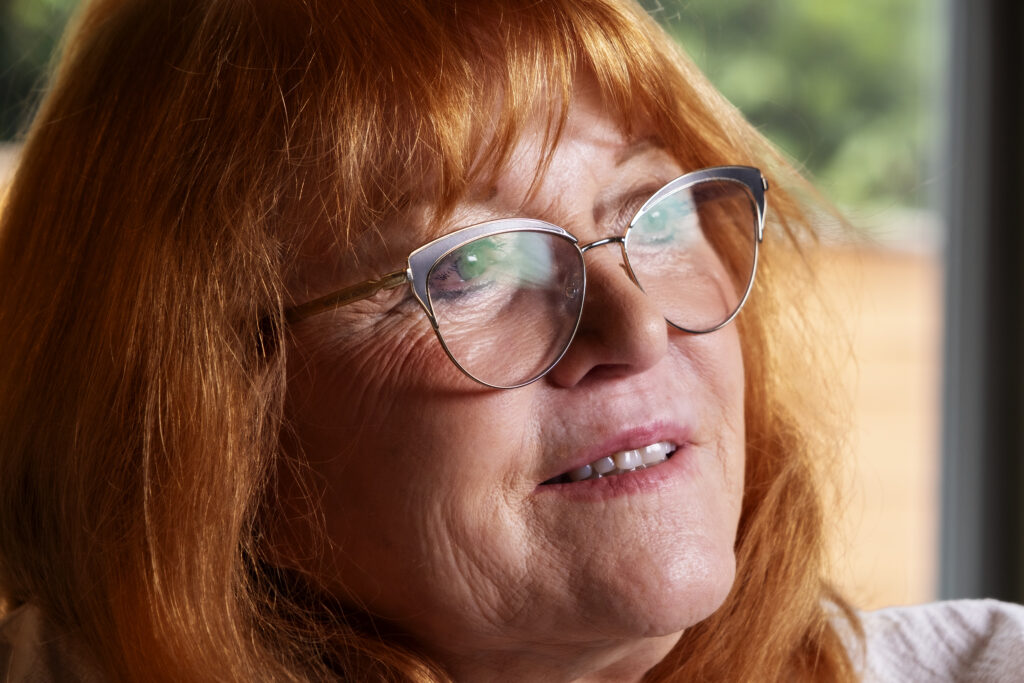
She is suspicious of the motives of Democratic leaders and believes President Trump will do his best to right the ship. “I believe he loves the country,” she said of Trump. Why else “…would a millionaire put himself through the pain and agony he’s gone through.”
Maureen, 79, was a Democrat. “I didn’t like the Bush’s,” and Bill Clinton was ok, everybody philanders, she said.
It was Barack Obama’s election in 2008 that pushed her to reexamine her politics and firmly placed her in the Republican camp. She saw Obama as divisive, fake, a political creation who pitted black against white. “He never really did anything. It was kind of fabricated,” she said. She feels the same about Taylor Swift, for what it’s worth.
“Having been backed by George Soros was enough for me,” she said. (Of Obama, not Swift). “He’s totally pro-Muslim, totally against whites.”
Maureen was born in Upstate New York but grew up in Bay Shore, Long Island, with her mother and father and eventually a younger brother, in a small one-bedroom apartment. Her parents slept in the living room.
She started college at 17 and was married with a baby at 19. She left college to be with her husband, and they spent four years in Alfred, N.Y., so he could finish school and get his degree. Eventually, they made their way to California. She had childhood dreams of being a scientist but that was not a path her parents let her walk. As a girl in the 1950s, “You had a choice: bookkeeper, teacher or nurse,” she said.
In California, she did assembly work, briefly. But found a career in accounting. She eventually returned to college; going to school at night while working as an accountant by day, she earned her degree in 1993. Maureen divorced her first husband and met Bill. The two were married on July 19, 1987, at the Rose Cathedral in Ventura, California. The same place Sonny and Cher married she said. Bill and Maureen moved to Florence in 2019.
There were struggles along the way. She was a young mother who hadn’t finished college, living in a marriage that was at times abusive, she said. But she created a successful career as an accountant, raised her son, and found a happy marriage. “I believe everybody is responsible for themselves,” she said. Stuff happens, “But you’ve got to adapt yourself to that.”
Maureen sees both weakness and corruption in today’s Democratic leaders. Machiavellian forces control President Biden and Vice-President Harris.
She thinks the reason so many undocumented – illegal is her preferred word – immigrants have been let into the country is so Democrats can register them to vote. “We decide to take in millions of people, millions. And the only reason to do that is to get the votes of people that should not be voting.”
There isn’t any evidence of an orchestrated effort to register immigrants to vote.
And she also sees unfairness in the policies and goals of the Democrats. Gas was cheaper under President Trump, as was the price of groceries. Forgiving student loans feel unfair. “Why did I pay off my loan?” “I remember when my ex and I didn’t eat sometimes,” she said.
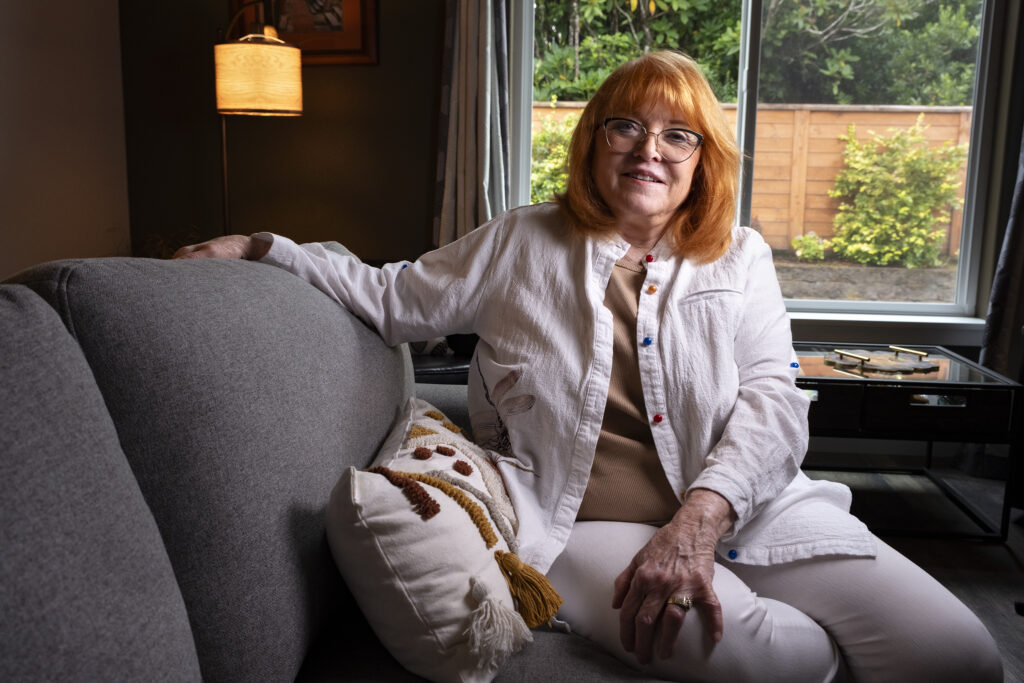
She believes Democrats are pushing for reparations to Blacks, infringing on free speech, and working to take away people’s guns.
Maureen said she gets much of her news from bizpacreview.com. It’s a news site she describes as Republican and describes itself as a “news website that provides breaking news and analysis unfiltered by the liberal bias that has eroded the media’s credibility.”
Many of Maureen’s worries and fears mirror the standard conservative Republican talking points. “The Democrats are socialists bordering on communism, Marxism, fascism. They’ve named Trump a fascist. He’s not. He’s a capitalist,” she said.
She sees Democrats as wanting to impose their will on her and the country, whether it’s COVID restrictions or socialized medicine, comparing the party to Mein Kampf and Big Brother.
And she is afraid of what will happen if Harris and Walz are elected. The thought makes her sick to her stomach. “We cannot handle another four years of this.”
A life-long Republican, Dave Davis believes the country has changed.
Dave Davis came prepared. Sitting at his desk, with his computer printer appropriately over his shoulder, he placed a pile of articles in front of us.
We were there to talk politics.
The first printout was from the Wall Street Journal. It was an opinion piece supporting a plan at the University of North Carolina to teach civics to students.”The goal is creating an environment where, as dean Jed Atkins puts it, ‘students can disagree better,’” the Journal’s editorial board wrote. This idea sits at the core of Dave’s beliefs.
He thinks schools and parents are failing our children and that times have changed for the worse. “I think when I was a kid, it was better,” he said, referring not just to schools but to society as a whole.
The printouts were stapled and titled by category—befitting a retired certified public accountant. The articles chronicled failings in the Oregon public education system, woke math, housing, affordability, the environment and crime. There were twenty-six articles in total. They represent what Dave said are examples of the 40-year failure of Democratic rule in Oregon.
“I’m a results-oriented guy,” he said. “If you’re going to be a liberal, pay attention to the legislation and the politics going on. If you’re going to be a conservative, do the same thing.”
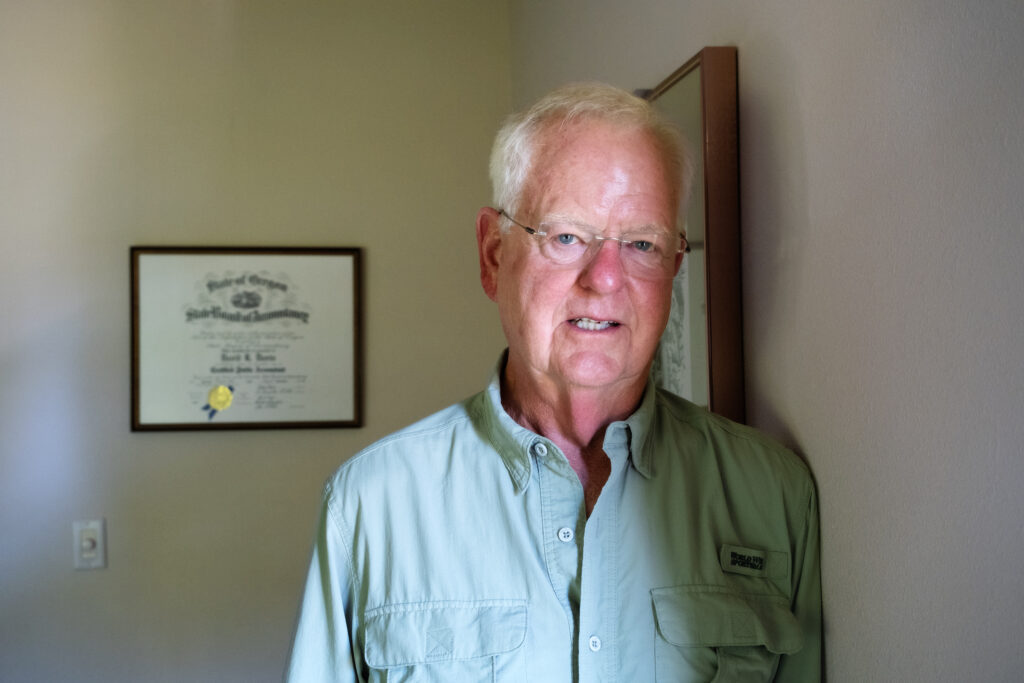
He sees the value in finding the facts and basing his conclusions on what he reads and hears. But he can be suspicious of facts that don’t align with his perspective.
He is unconvinced on the causes and cures for climate change. “I think there’s climate change,” he said emphatically. Then added, “But you know, we used to have glaciers, right out here too… I have yet to see any proof that it’s driving your car that’s doing it,” he said.
And the climate scientists? It is in their interest to find evidence to support their view, so they keep their grants, Dave said.
As part of our conversation, Dave asked for sources and evidence on the topic of human-caused climate change, so here are a few:
- Human-caused climate change is real. It’s significant. And we are living with it right now.
- Vehicle emissions are a huge part of the problem in the U.S.
- Oregon is already facing the consequences.
- Scientists overwhelmingly agree that climate change is real and is caused by human activity.
Dave also argues that Oregon, in the scheme of things, contributes very little to climate change. The state adds a fraction of a percent to the total U.S. carbon emissions. But, plans to reduce the state’s production of greenhouse gasses will have a significant economic impact on its residents. “The effect on living in Oregon is going to be huge.” “And it will get worse for those people who live on the margins,” he said.
“I don’t think we have a snowball’s chance in hell of changing climate change,” he said. Better to learn to live with it rather than try to change it.
Dave, 77, grew up happy in the 1950s in what he described as a classic middle-class family with a mom and a dad. It was, as he described, a time when kids could play safely outside, there was discipline in the schools, and life was good. Not so much now, he feels.
He sees a modern era where there is less personal responsibility and too much reliance on the government. A government he is suspicious of.
Dave enlisted during the Vietnam War. He could have avoided military service but chose to volunteer. “Well, I thought I should. We were proud of the country. And if the country was in need, you volunteered,” he said.
But the government’s handling of the war left him disillusioned.
After college at the University of Oregon, Dave went to work as an accountant. He saw student protests, “watching college students tear up property and figuring that we’ll just pay for it.” While he worked hard and paid taxes, he saw himself surrounded by a world of young people who didn’t. “The drug thing was like people just never quite raised to the level that they wanted to work, take care of themselves,” he said.
Then, as an accountant, he saw politicians create laws and exemptions that favored themselves and rich donors.
It confirmed his view of government as bloated and often overreaching. “Anytime the government gets involved, it’s inefficient, and there’s not a good outcome as far as I can tell,” he said.
The problems today, as Dave sees it, are caused by a failure of personal and parental responsibility. We are responsible for ourselves. Government should fund the military, fix the roads, keep an eye on commerce, and then step out of the way.
“I think when I was a kid, it was better.”
He tells a story to illustrate his point. Only one girl got pregnant in his high school. “It was a huge deal. She left and didn’t return, and when she did, she was wearing black.”
But now, now is different.
“It’s okay to be a single mother; in fact, it’s pretty much encouraged,” he said. We’ve gone from “That’s a terrible thing” to “Bring the kid to class,” he said. “And it’s not good. It’s not good for the kid or girl.”
This is a story where the facts paint a more complicated picture. Teen birth rates hit their peak in the U.S. in the late 1950s. In 1957 the birth rate for girls 15-19 was 96.3 per 1,000. In 2022 the rate was 13.6.
But even with today’s low rates, teen birth rates are higher in the U.S. than in other Western countries. The causes and solutions are complicated and worthy of discussion and debate. But whatever the reasons, there were a lot more kids having kids in the 1950s than now.
But that doesn’t mean it isn’t a problem. Teens who have babies are much less likely to graduate from high school and more likely to need public assistance. Their babies are more likely to have poor behavioral and health outcomes.
All of this data comes from a 2024 report from the Congressional Research Service.
Are parents, schools and society more permissive? What about the other issues Dave raised? He has concerns over inflation and the cost of food, the cost of housing, the care of our roads and infrastructure, climate and national security.
What lens do we look through to decide how to decide who to believe and who to support?
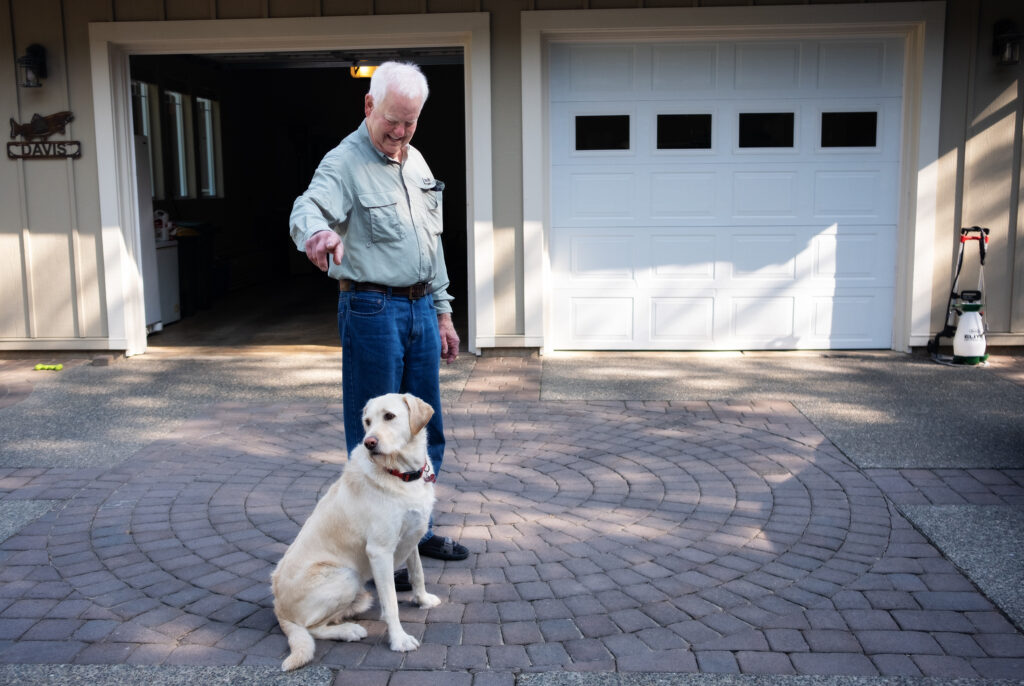
For Dave Davis, the decision for Election Day is clear.
“Trump is a jerk. If he called me up and said, ‘Would you come have a beer with me?’ I’d say ‘No.’ But I love his policies. We really started to excel when he was president. He’s not a nice guy but that’s kind of how I feel. He was strong.”
In a world that looks increasingly out of control, there is logic in wanting strength. War in Israel and Gaza, and in Ukraine began under Biden’s watch, he pointed out.
“Like I said, Trump’s not a close personal friend of mine, but I would much rather have him there than this Kamala Harris.”
Eileen Wisman describes herself as a pragmatic and moderate Democrat.
Her father was the kind of Democrat who was raised to hate the American League(as in baseball) and Republicans. Her mother is frustrated she can’t go to the polls and has to vote by mail. She’s 95.
Eileen Wisman comes from solid Democratic stock. She tells the story of her dad, who, when asked by a friend why he dressed like a Republican in Brooks Brothers suits, replied, “I’m like a U-boat. I swim among you. Gathering intelligence.”
Her mom and her dad were both sarcastic, serious Democrats. Her dad worked as an architect and mentored people from disadvantaged backgrounds. Her mom was always involved in Democratic politics. In her late 80s, she was out campaigning for Hilary Clinton’s presidential run.
She was raised to have a deep suspicion of inherited money. “My dad used to say that a Republican was a Democrat with a $1,000,” she said.
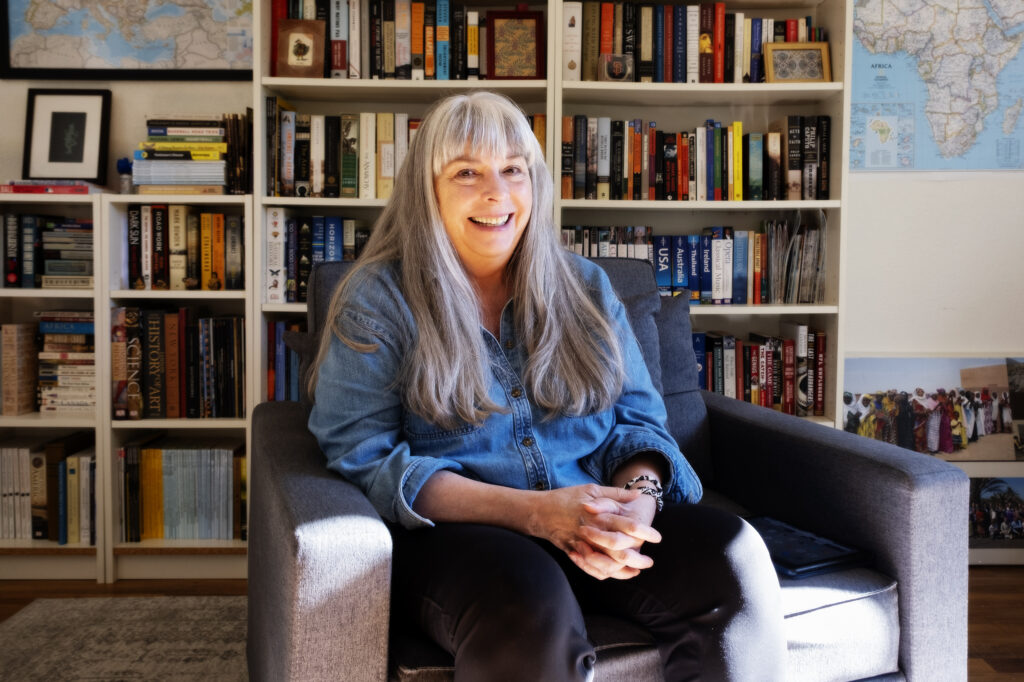
She is neither as liberal nor judgmental as her parents. “I really, really try not to be judgmental. I try very hard.” Eileen admits she isn’t perfect. “I like the pithy line just as much as my father ever did.”
Eileen is pragmatic and moderate, with strong beliefs about fairness and equity. She is quick to say she isn’t a socialist or communist, but does believe no one needs a billion dollars.
She thinks government is part of the solution. But would vote character over policy.
Her method of political triangulation has evolved over the years. When she was much younger, she used the breakfast test. One she admits was a bit superficial. “Would I have breakfast with this guy?”
That evolved into the newspaper test. Back when newspapers were a thing. “I did develop a true test. I used to open the newspaper and cut out the person’s name and then look at the positions,” she said, describing that as “sort of a policy thing.”
But for a while now, she has used a three-part character test.
- Are you sane?
- Do you have a moral code that enables you to distinguish right from wrong?
- Would you put the country ahead of your own needs?
By this measure, she said, Liz Cheney passes. Donald Trump doesn’t. But neither did Joe Biden, at least until he withdrew from the race. “Mitt Romney scores 100%. John McCain – 100%. Those are all people I would vote for.”
“And as much as I admired Ruth Bader Ginsburg and thought she was brilliant and had a brilliant approach to the law, she doesn’t pass the test. She should have stepped down,” Eileen said.
She is quick to acknowledge her own privileged upbringing. She spent part of high school studying in France and the UK and attended a small liberal arts school in Pennsylvania.
After college, she joined the Peace Corps, where she met her husband, Steve. Being a Peace Corps volunteer in Niger in Africa was a defining experience, she said. “I feel like that sort of set the tone, you know, for my life.”
Character may be her measure of a candidate, but she is adamant about a need for change. Equity drives much of this.
She describes conservatives as people who think things are mostly ok and change can happen slowly. “Let’s not fix what isn’t broken,” she said.
Where liberals see a system with large cracks that need repair. Now. “We can’t wait 50 years when there are kindergartners now who need a better future,” she said.
The Republican argument is often one of personal responsibility. People need to step up and take care of themselves and their families. It’s not the government’s job.
Eileen doesn’t buy it. “A lot of the individualists who are taking responsibility for their own lives and pulling themselves up by their bootstraps are white men who never realized that they started on second or third base,” she said. “It was never a level playing field.”
The solution, she believes, is more government investment. And if that means higher taxes, so be it. “I’d certainly be willing to pay an extra thousand bucks a year in property taxes if that would establish some facilities to help people who are homeless and who are struggling on the streets or education.”
On many issues, she is in line with the Democratic party. She supports abortion rights and is concerned about climate change. On other issues, her moderate, pragmatic streak is more apparent.
She was disappointed with President Biden for campaigning as a centrist in 2020 but governing from the left. Broad student loan relief was bad policy aimed at getting votes, she said. She is comfortable with affirmative action being based on economic status rather than race.
“If you believe in progress, then you have to look at practical solutions and you don’t get there if you don’t respect other people, you just don’t,” she said. “I’m more interested in what moves us all forward. And that only happens with respect, really.”
She is happy to talk with Republicans and conservatives, she said. Though not always about politics. “I do think that I have respect for people from different backgrounds, from different political opinions,” she said.
But there are lines in her sand.
She objects to the flag on a local pickup truck that reads, “F**K Biden. “What good is that doing? I don’t want to see ‘F’ Trump. I don’t want to see ‘F’ Biden.”
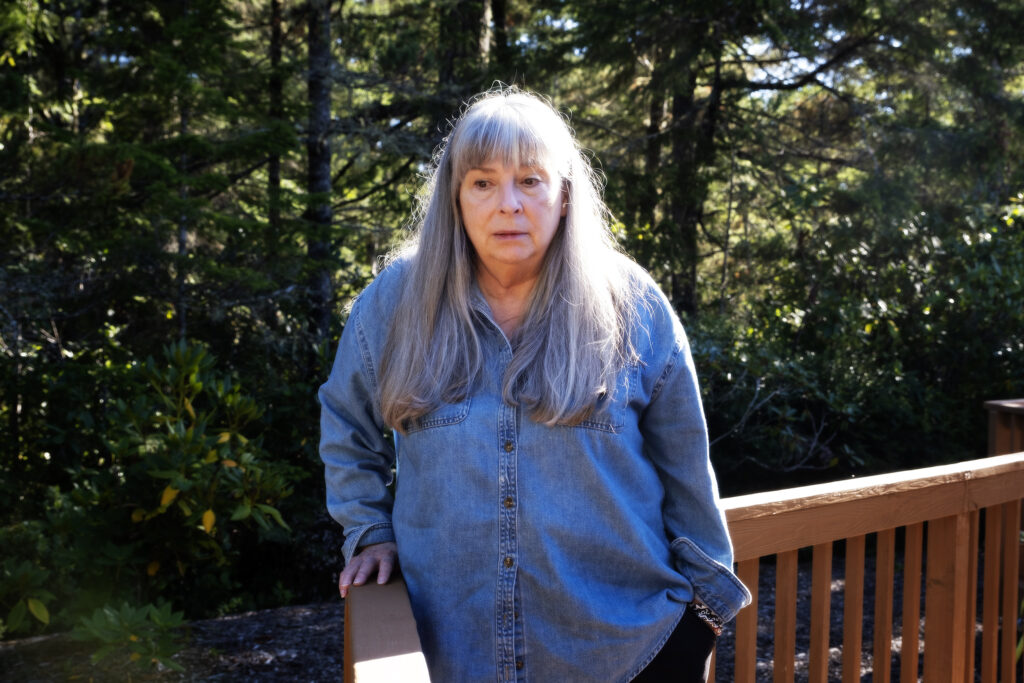
The presidential election is a place where she finds it difficult to moderate her tone. The pragmatic moderate is all in on her fear of the return of President Donald Trump.
That he doesn’t pass her three-point test is only the beginning. Her father, before the 2016 election, compared Trump to Hitler. “You know, my dad went to the Nuremberg trials. So there’s somebody who, you know, was very familiar with what was going on. And he was right.” she said.
Her pragmatic, moderate, perhaps hopeful side thinks the country will see through him, she said. She hopes weariness and exhaustion around the chaos will convince people to vote for Harris.
“ I hope that the fatigue factor will be the deciding factor in this whole thing. You know, ‘we’ve had enough. Let’s put it to bed and move on.’ Even if she does nothing for four years, let’s just move on.”
An ongoing series of conversations about politics today. If you’re interested in participating, or are curious about the project, please get in touch using the contact form on the website.
As part of this project, I’ve created a page with links to fact-checking sites. It’s a place to start looking for facts that can then drive our decisions and actions.

What a timely and important conversation for our community! Thank you, Will, for starting the conversation. And huge thanks to Dave and Julie for being willing to share their views.